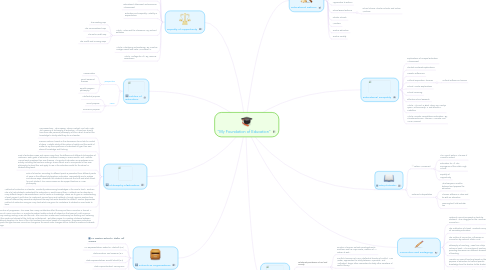
1. Schools as Organizations
1.1. U.S Senators: Richard C. Shelby, Jeff Sessions
1.2. U.S Representatives: Robert B. Aderholt (R-4)
1.3. State Senators: Paul Bussman (R-4
1.4. State Representatives: Randall Shedd (R-4)
1.5. State Superintendent: Tommy Bice
1.6. Local Superintendent of Morgan County: Mr. Bill Hopkins, Jr. ; Athens City Schools Superintendent:
2. Equality of Opportunity
2.1. Calculating Education and Life Outcomes
2.2. Schools Differences and Educational Outcomes
2.3. School Segregation
2.4. Educational Attainment and Economic Achievement
2.5. Education and Inequality: Mobility or Reproduction
2.6. Article -"Class and the Classroom" By; Richard Rothstein
2.6.1. The Reading Gap
2.6.2. The Conversational Gap
2.6.3. The Role Model Gap
2.6.4. The Health and Housing Gaps
2.7. Article-"Chartering and Bartering" By; Caroline Hodges Persell and Peter W.Cookson,Jr.
2.8. Article- :College-for-All" By; James E. Rosenbaum
3. Politics of Education
3.1. perspective
3.1.1. Conservative
3.1.2. Social Darwinist theories
3.1.3. Ronald Reagan's philosophy
3.2. Vision
3.2.1. Intellectual purpose
3.2.2. Social purpose
3.2.3. Economic purpose
4. Philosophy ofEducation
4.1. Key researchers- John Dewey, Johann Herbert, and John Lock. The meaning of Philosophy of Education; All teachers, should have their own personal philosophy of life in which to select the knowledge to clarify what they do as a teacher.
4.2. Generic Notions- based on the discussions from Plato for central of ideas. Aristotle study of the nature of reality, and the world of matter to say the importance of individuals to gain their own ideas of knowledge and thinking.
4.3. Goal of Education views and visions come from the difference of different Philosophies of Historians. Each goals of education is different, Dewey's, Diane Ravitch, and Aristotle, Marxist each questions their own theories. The goals of education are emphasize as an activity including the teachers making a choice which one to incorporate in their own philosophy to direct this and apply to use in the education world for the school or students they teach.
4.4. Role of a teacher according to different points is presented from different points of views in the different philosophies. Educators responsibility are to analyze and discuss ways, ideas with the students to discover the truth and what is best for each student. The various views can be support teachers o n own philosophy.
4.5. Methods of instruction is a teacher constantly rediscovering knowledgee in the area to teach. Teachers role is to help students understand the materials in a world around them. Methods can be describe in many different ways to demonstrations, and to hands on knowledge. These are to gain an understanding of past, present, and future, to implement various forms and methods. Through rigorous analysis from views of different key researcher explained the way that works benefits the student. Teacher approaches method of instruction using so many tools which are given for revelations to students in new levels to learn.
4.6. Curriculum of progressive- The views from many contributors effect the way and how curriculum is formed. A notion of a core curriculum, or a particular subject matter include all subjects in the bases of; math, science, history, reading, writing, music and the arts. This curriculum made some controversy has thinking and believing that the needs and interest of the child are not balanced. But others argue it is creating a balance between traditional discipline it is favor of the child centered curriculum based on imagination. Progressive educators supports this type because curriculum changes as the social order changes and as children's needs and interests change.
5. Curriculum and Pedagogy
5.1. Historical Curriculum Based on book by Kiliebard, "The Struggles for the American Curriculum".
5.2. The Publication of a book "Cardinal Principles Of Secondary Education"
5.3. The Politics of Curriculum; Influences on Curriculum by National, State, Local.
5.4. Philosophy of Teaching; Views from Philip Jackson's book, "The Practices of Teaching" providing discussions on different dimensions of teaching.
5.5. Mimetic is a view of teaching based on the purpose of education to transmit specific knowledge from the teacher to the student
5.6. Transformative is a view set of assumptions to change the student in some meanful way-including; intellectually, creatively, spiritually, and emotionally
6. Educational Reform
6.1. Effective Teachers
6.2. Educational Reform from the 1980's to 2012
6.3. Federal Involvement in Education
6.4. Goals 2000: Building on a Decade of Reform
6.5. No Child Left Behind
6.6. Race to the Top
6.7. Approaches to Reform
6.8. School Based Reforms
6.8.1. School Choice, Charter Schools, and Tuition Vouchers
6.9. Charter Schools
6.10. Vouchers
6.11. Teacher Education
6.12. Teacher Quality
7. History of Education
7.1. Reform Movement
7.1.1. The Age of Reform: The Rise if Common School
7.1.2. Education for All: The Emergence of the Public High School
7.1.3. Equality of Opportunity
7.2. Historical Interpretation
7.2.1. What Benjamin Franklin believed and proposal for education
7.2.2. Thomas Jefferson's ideas and his Bills on education
7.2.3. New England /Old Deluder law
8. Sociology of Education
8.1. Relationship Between School and Society
8.1.1. Function Theories- earliest sociologist Emile Durkheim and his major works; mention of "A Nation at Risk".
8.1.2. Conflict Theories-Karl Marx; intellectual founder of conflict. Max Weber; approaches the study between "specialist" and "cultivated" begin other researchers to study other variations of conflict theory.
8.1.3. Interactional Theories- is critiques about the functional and conflict perspectives and analysis the "big picture". The critiques level of analysis to understand the relation of school and society better by observations of these two theories.
8.2. Three Effects of Schooling on Individuals
8.2.1. Knowledge and Attitudes; Employment;
8.2.2. Education and Mobility; Inside the Schools.
8.2.3. Teacher Behavior; Student Peer Groups and Alienation.
9. Educational Inequality
9.1. Explanations of Unequal Education Achievement
9.2. Student-Centered Explanations
9.3. Genetic Differences
9.4. Cultural Deprivation Theories
9.4.1. Cultural Difference Theories
